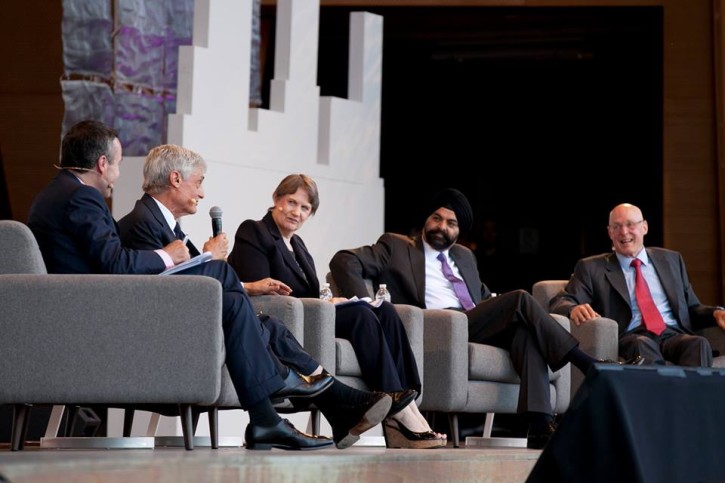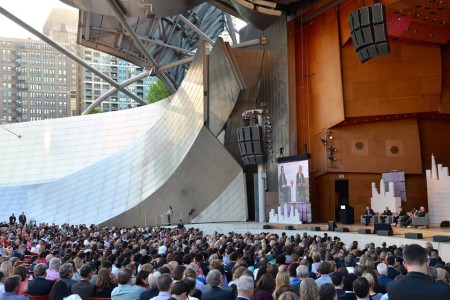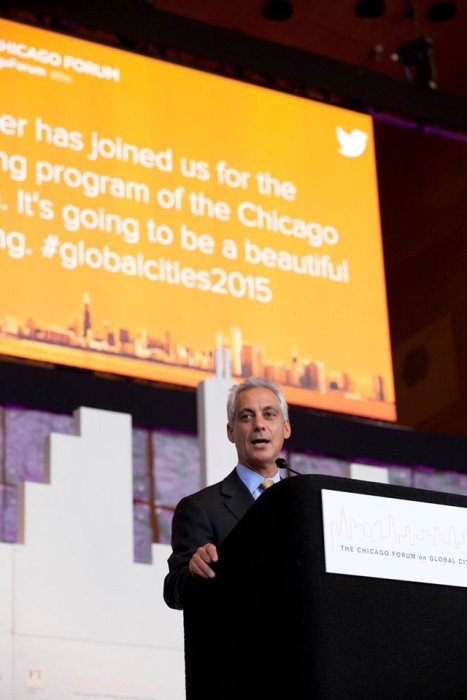
At a conference on the importance of global cities, Hank Paulson declared, “urbanization is the future of humanity.” With more than half of the world’s population living in cities today and billions more expected in the coming decades, Paulson has a strong case. Speaking on a panel at the Chicago Forum on Global Cities, Paulson went on to emphasize that the biggest urban challenges are going to come in the developing world, where the vast majority of today’s new buildings are going up. “Nowhere in the developing world do you see a successful urbanization model. You just don’t see it,” he said. “You see a lot of flawed policies that need to be changed.”
The two-day conference, organized by the Chicago Council on Global Affairs, kicked off with a welcome from Chicago Mayor Rahm Emanuel, followed by the panel discussion held in Millennium Park. Joining Paulson on the panel were former Treasury Secretary Robert Rubin, former prime minister of New Zealand Helen Clark, and Ajay Banga, CEO of MasterCard. Lionel Barber, editor of the Financial Times, which co-sponsored the conference, moderated the panel.
 To Paulson, the challenge of finding the right model also represents the biggest opportunity to get things right. “The opportunity comes from the fact that we’ve learned from our mistakes, in both advanced economies and developing economies, so we have a lot of knowledge and know the sorts of things we need to do differently,” he said. Paulson added that he is focusing on cities, primarily through his work at the Paulson Institute, because he believes that environmental issues bring with them big economic risks. “If you believe that, as I do,” he said, “you have to say that the ecological and environmental footprint in our cities are what are going to drive that outcome.”
To Paulson, the challenge of finding the right model also represents the biggest opportunity to get things right. “The opportunity comes from the fact that we’ve learned from our mistakes, in both advanced economies and developing economies, so we have a lot of knowledge and know the sorts of things we need to do differently,” he said. Paulson added that he is focusing on cities, primarily through his work at the Paulson Institute, because he believes that environmental issues bring with them big economic risks. “If you believe that, as I do,” he said, “you have to say that the ecological and environmental footprint in our cities are what are going to drive that outcome.”
Rubin countered Paulson by making the point that, while “there is a lot that cities can do,” national policies will be the primary drivers of growth. In particular, he brought up the example of solving climate change: “It seems to me the single most important thing we can do is change the price of carbon, and that can only be done at the federal level.”
Clark, who is now head of the UNDP, embraced the notion that cities can be powerful centers of growth for countries worldwide. She began by describing a policy that she helped legislate as New Zealand PM which gave local governments a “power of general competence.” This power meant that cities could take on any function they wanted—except for raising a defense force or entering into treaties with other countries—as long as they had the support of citizens.
 “This meant that cities and local authorities could then respond to what their citizens actually wanted them to do,” said Clark. The policy created a lot of diversity in urban frameworks around New Zealand, which was beneficial for the country. Clark’s lesson: national governments should “let go—and let cities find their way—and they will be engines, then, of growth and opportunity for the country.”
“This meant that cities and local authorities could then respond to what their citizens actually wanted them to do,” said Clark. The policy created a lot of diversity in urban frameworks around New Zealand, which was beneficial for the country. Clark’s lesson: national governments should “let go—and let cities find their way—and they will be engines, then, of growth and opportunity for the country.”
Representing a voice from the private sector, Mastercard CEO Banga began by quoting the mayor of Bogotá, saying “the ideal city would not be one where even a poor person could use a car, but one where even the rich would prefer to use public transport.” Banga proposed the concept of national policy creating a “box” for cities to operate, but noted that how local governments operate within that box is crucial. For a resurgent city like Chicago, which Mayor Rahm Emanuel reminded the audience was “the only inland American city with a global footprint,” these notions could not be more relevant.



